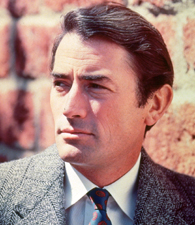Placed in Hollywood’s limelight by a mix of hard work and simple good luck, Gregory Peck was known for a blend of honesty, strength and an air of heroism that helped him become one of American cinema’s favorite and most dependable leading men.
Gregory Peck’s Early Days
Eldred Gregory Peck was born in La Jolla, Calif. on April 5, 1916. His parents divorced when he was very young, marking the beginning of an often lonely and divisive childhood.
Raised mostly by his grandmother, Peck found periods of solace with the family dog and through excursions to the theater, an experience that instilled a love of acting and the cinema.
While enrolled at the University of California, Berkeley, he struggled with finances and attempted to balance academics with a place on the school’s rowing team. After performing in university theater productions, he decided to devote himself completely to the stage.
Intent on heading east to Broadway, Peck suffered a back injury that would not only put an end to his rowing career, but also excused him from military service during World War II.
After arriving in New York in 1939, Peck continued the balancing act of supporting himself while pursuing his passion for the stage. He held numerous side jobs, including working as a barker at the 1939 World’s Fair and as an usher at Radio City Music Hall.
Eventually, the roles arrived and Peck made his Broadway debut in the play “The Morning Star” in 1942.
Sources in this Story
- The New York Times: Gregory Peck Is Dead at 87; Film Roles Had Moral Fiber
- The Internet Movie Database: Gregory Peck
- The Guardian: Gregory Peck
- Time: Leading Man
- BBC: Peck talks glamour at Cannes
- Hollywood Reporter: Gregory Peck’s Widow, Veronique Passani, Dies at 80
- YouTube: 1987 Robert Bork TV ad, narrated by Gregory Peck
- The Kennedy Center: Biography of Gregory Peck
Notable Accomplishments
Blessed with height and what producer Darryl Zanuck called a “biblical face,” Peck fit the leading man mold and faced little competition thanks to a dearth of available male talent during the war.
Soon, however, Peck carved out a niche in Hollywood for portraying characters of quiet strength and dignity, playing “morally anguished heroes who displayed grace under fire,” according to The New York Times.
“I don’t think I could stay interested for a couple of months in a character of mean motivation,” Peck once said.
Setting him apart from other leading men of the time was the ability to balance actual skill with stardom.
“He is U.S. cinema’s first male idol to resist typing: the first to devote himself successfully to the art of acting, rather than a stylized display of physique and personality,” reported Time magazine in a cover story on Peck in 1948.
However, it wasn’t until a stretch of work in the late 1950s that Peck began to earn critical appreciation. After a run of four Oscar nominations in six years, Peck finally won for his role as Atticus Finch in “To Kill a Mockingbird.”
Celebrated to this day for his role as a Southern lawyer who stands up to represent an African-American man wrongly accused of rape, “Mockingbird” remained the actor’s favorite film.
Staring opposite newcomer Audrey Hepburn in “Roman Holiday” in 1953, Peck proved he could do lighthearted comedy as well as anyone—and ended up finding romance while he was at it. Still reeling from the divorce of his first wife, Peck met Veronique Passani while on location in Rome and married her soon after. The couple had two children and remained married for the rest of Peck’s life.
The Man and His Work
- “The Gregory Peck Film Collection”
- “Roman Holiday”
- “Cape Fear”
- “MacArthur”
- “Gregory Peck: A Biography”
The Rest of the Story
Although Peck’s film career slowed in the late 1960s, resurgence in the 1970s came with roles in “The Omen” and “MacArthur.” The California native also turned his attention to his private life, actively pursuing a host of progressive causes.
Politically active since he stumped for Harry Truman in 1948, Peck remained a vocal and financial supporter of liberal causes throughout his life. In 1987, he narrated a television spot produced in opposition to the nomination of Judge Robert Bork for the Supreme Court.
He was also a founding member of the National Council on Arts, president of the Academy of Motion Picture Arts and Sciences, and chairman of the board of trustees of the American Film Institute from 1967-1969.
Making his last screen appearance in a television version of “Moby Dick” in 1998, Peck passed away on June 11, 2003, at the age of 87.
This article was originally written by Christopher Coats; it was updated March 3, 2017.











